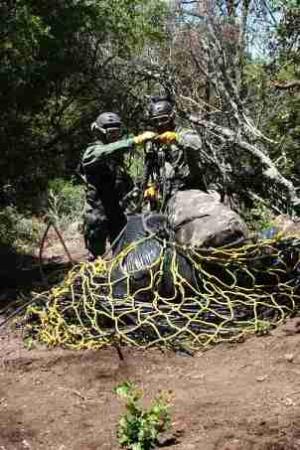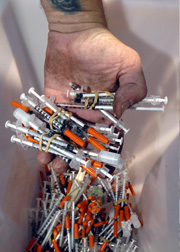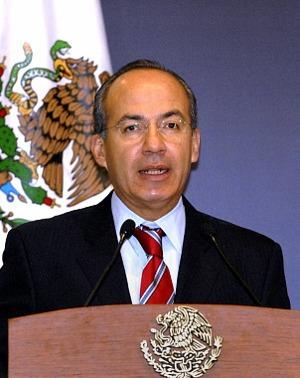For nearly 30 years, the Campaign Against Marijuana Planting has waged a quixotic battle to eradicate California's outdoor marijuana industry. It's at it again this year.
A "transpartisan" effort to push marijuana legalization and get out the vote in November got its official kick-off Tuesday.
StoptheDrugWar.org has completed the first stage of a major upgrade and expansion of our web site. This article explains some of what we've done so far, and also where some sections of the site that you've been used to from before can still be found.
While New York has long had needle exchange programs, their participants faced hassles from the cops for carrying needles and residues. That will be illegal now.
More crooked prison and jail guards get busted, another sticky-fingered cop goes down, so does a Rio Grande Valley lawman, a former California Highway Patrol trooper is in big, big trouble, and a small-town Texas police force has troubles in the dope squad.
After a presidency most notable for the ever-rising death toll in his war with the cartels, Mexican President Calderon is starting to sing a different tune.
President Obama has signed into law a bill that reduces, but does not eliminate, disparities in federal sentencing for crack and powder cocaine offenses. It isn't retroactive, which means current prisoners still wait for relief.
The Massachusetts legislature passed, and the governor signed, legislation to reform some mandatory minimum sentences. But the final version omitted some important provisions originally endorsed by the Senate.
There is now an American citizen on death row in for selling speed in Indonesia.
Three months out from election day, California's Prop 19 marijuana legalization campaign is out-fundraising the opposition by better than ten-to-one. And unlike the opposition, a chunk of Prop 19's money is in the form of small donations from the grassroots.
The Marijuana Policy Project and its Nevada affiliate want a marijuana legalization initiative on the 2012 ballot. A new poll suggests they have a lot of work to do over the next 27 months if it's to pass. Advocates say public education is what it's going to be about.
Events and quotes of note from this week's drug policy events of years past.
It's August in California, and that means the state's multi-billion outdoor marijuana crop is ripening in the fields. It also means that the nearly 30-year-old effort to uproot those plants, the Campaign Against Marijuana Planting (CAMP), is once taking up its Sisyphean task of wiping out the crop. The choppers are flying, the SWAT teams are deploying, and the federal funds that largely feed CAMP are being burned through.

marijuana eradication helicopter
"It's about the same this year," said Gregory.
In just the past couple of weeks, CAMP and associated law enforcement agencies pulled up 91,000 plants in Santa Barbara County, 48,000 plants in Sonoma County, and 21,000 plants in Calaveras County. So far this year, in Mendocino County alone, more than 470,000 plants have been destroyed.
The enforcement effort has also led to the deaths of at least three growers this year. A worker at a grow in Napa County was killed early last month when he pointed a gun at police. Another worker at a grow in Santa Clara County was killed two weeks ago. And last week, police in Mendocino County killed a third grower they encountered holding a rifle during an early morning raid.
While the number of deaths this year is high -- one grower was killed in Lassen County last year, one was killed in Humboldt County in 2007, and two were killed in Shasta County in 2003 -- there have also been other violent incidents. Last month, somebody shot out the rear window of a Mendocino County Sheriff's vehicle as it left a grow raid in the western part of the county, and police in Lake County encountered an armed grower there, but he fled.
CAMP and other law enforcement efforts may destroy as much as 25% of the state's outdoor harvest, but it is unclear what real impact the program is having. Prices for outdoor marijuana have been dropping in California for the past year, the availability of pot remains high, and use levels appear unchanged.
[image:2 align:left caption:true]"To point out the obvious, in almost 30 years, CAMP has been unable to reduce marijuana use or availability," said Mike Meno, communications director for the Marijuana Policy Project. "All it does is pay for law enforcement officers to go out in the woods and pull weeds. Every year, they find more and more, and that just motivates illegal growers to plant more."
"CAMP is an enormous waste of money -- I've even heard law enforcement refer to this as helicopter rides," said Margaret Dooley-Sammuli of the Drug Policy Alliance in Los Angeles. "It's fun for them, but spending this money on that doesn't do any good, and that's a shame when we're in such dire budgetary shape on all levels."
"I think we are making a difference," said CAMP spokesperson Gregory. "There are still plants out there, but at the same time, the way we look at it, they are willing to defend their grow sites, so we're obviously impacting them monetarily."
Gregory blamed Mexico drug trafficking organizations for much of the illicit production, but was unable to cite specific prosecutions linked to them. She also cited environmental damage done to national parks and forests by illicit grows.
"Nobody wants our national parks and forests to be turned into illegal marijuana grows," said Dooley-Sammuli, "but the question is what is the best approach. The more we spend on CAMP, the more helicopter rides and gardening projects we get, but marijuana prices don't go up, and there is no measurable impact on availability. What we do get is increased violence in the national parks. The government should be looking at how best to reduce illegal grows," said Dooley-Sammuli. "One way would be to allow lawful cultivation as part of a regulated market."

Deputies prepare to repel out of helicopter into a marijuana grow (Santa Barbara Sheriff's Office via SB Independent Weekly)
One approach to defanging CAMP is to work to cut off the federal funding spigot. Since it is largely dependent on federal dollars, attacking federal funding could effectively starve the program, especially given the perpetual budget crisis at the state and local level in California. But that runs into the politics of supporting law enforcement.
"There are many federal funding streams that go to state and local law enforcement, and there is a lot of politics around that," said Dooley-Sammuli. "CAMP really has little to do with marijuana and a lot to do with funding law enforcement."
Shasta County Sheriff Tom Bosenko is a case in point. He told the Wall Street Journal last month that although he is having to lay off employees, reduce patrols, and even release inmates early because of the budget crunch, he's spending more money on pot busts because "it's where the money is."
He has spent about $340,000 since last year on eradication in order to ensure that his department gets $492,000 in federal anti-drug funds. That is "$340,000 I could use somewhere else in my organization," he said. "That could fund three officers' salaries and benefits, and we could have them out on our streets doing patrol."

Sheriff's Deputies transporting larger marijuana plants
from site (SBSO via SB Independent Weekly)
It's the law of unintended consequences that provoked the boom in growing on public lands in the first place, said Meno. "Around 2002, law enforcement said they started seeing a dramatic shift toward outdoor grows on public lands, but that's because they were raiding people growing indoors and on private property. Prohibition and law enforcement tactics drove those people out into those federal lands. Now, some of our most treasured resources are overflowing with marijuana because they were pushed there by law enforcement."
For CAMP, the endless war continues. "The laws are what they are," said Gregory. "Whether it's marijuana or meth or heroin, we're going to enforce the law. If the law changes, that's different," she said, responding to a query about the looming marijuana legalization vote. "But we're always going to have something to enforce."
back to top

"Just Say Now" campaign logo
Ex-cops and college students, conservative constitutional scholars and a liberal-leaning web site, former narcs and hip-hop figures -- all are strange bedfellows in a new campaign to legalize marijuana that launched Tuesday. Led by the political blog site
FireDogLake, the
Just Say Now campaign has also enlisted
Students for Sensible Drug Policy (SSDP),
Law Enforcement Against Prohibition (LEAP), and
GoTV, as well as prominent individuals from across the political spectrum in what it is billing as a "transpartisan" movement to free the weed.
The campaign's goals are to:
- "Organize transpartisan support for ending marijuana prohibition across the country by combining the online organizing efforts of FireDogLake, which has 100,000 readers a day, with the grassroots organizing abilities of Students for Sensible Drug Policy, with chapters at 150 campuses across the country.
- "Turn out voters to support marijuana initiatives on the 2010 ballot in Arizona, Oregon, California, Colorado and South Dakota. [Editor's Note: The Colorado initiative campaign is actually aimed at 2012.]
- "Work to get marijuana initiatives on the ballot in multiple states in 2012, with an emphasis on presidential battleground states, to encourage a national conversation about marijuana policy during the next election.
- "Inform the conversation around ending prohibition and educate the public about the true state of our antiquated drug policy
- "Encourage government at all levels to adopt more sane, pragmatic and reasonable policy regarding marijuana."
As part of the campaign, Just Say Now is also launching a petition to President Obama calling for an end to pot prohibition. In addition to being available online, students at SSDP chapters around the country will be carrying copies for signing on campus.
"The war on marijuana is a failure," the petition reads. "The government wastes billions of dollars fighting drug cartels that thrive on marijuana prohibition. Thousands of people are killed, police officers' lives are put in risk, and taxpayer dollars are wasted for nothing. With states on the verge of legalizing marijuana, it's time for a reality check. The federal government should drop its active opposition to marijuana legalization. It's time to end the war on marijuana."
"We're delighted to be joining with SSDP to launch this campaign, and bringing together a transpartisan coalition of support," said FireDogLake's Jane Hamsher. "We have a significant online presence, and SSDP has a significant grassroots presence. Young people want marijuana to be legalized in overwhelming numbers: Young voters are not just excited to support legalization, but are much more likely to turn out to vote if marijuana is on the ballot. We're delighted about organizing legalization supporters and getting them to the polls on election day."
"I am thrilled to be partnering with FireDogLake at an historic moment in the marijuana legalization debate," said SSDP executive director Aaron Houston. "Our coalition will serve as a long-needed cooperative effort that will marry expert political minds with an enormous grassroots network of students and activists around the country. Together, we'll get the message out that we can cut off 70% of the cartels' profits if we tax and regulate marijuana like alcohol."
Students across the country will be working the phones to identify sympathetic potential voters and get out the vote in November, said Hamsher, casting an eye toward the Tax and Regulate Cannabis marijuana legalization initiative in California. "We're hoping California is going to be a turn-out election and not a persuasion campaign," she said, alluding to the low level of undecided voters, around 10% in most polls. "Support declines as folks get older, and off-year elections tend to turn out older voters, not younger ones. We're hoping to identify people who support the measure who will be willing to put in efforts to pass it in the states that have measures on the ballot."
Pot legalization could be just the issue to bring key groups of voters to the polls. As Ryan Grim reported in the Huffington Post Tuesday, recent polling suggests that "surge voters" (those who came out in historic numbers for the 2008 election), young voters, single women under 40, and Hispanics would be more inclined to come out and vote if legalization is on the ballot.
"As a police officer, I can tell you that the 'war on marijuana' has done nothing to reduce marijuana use," said LEAP executive director Neill Franklin, a 33-year veteran cop who ran anti-narcotics task forces for the Maryland State Police and Baltimore Police Department. "But this failed prohibition policy has achieved some results: far too many cops killed in action, billions of tax dollars wasted, powerful and well-funded drug cartels and out-of-control violence in our cities. When my good friend Ed Toatley was killed in the line of fire during an undercover operation, Maryland lost one of the best narcotics cops in our state's history. It is in his honor, and in the names of all the good cops whose lives have needlessly been lost in this failed 'drug war,' that I now work to change these deadly laws."
Seeing a political opening, the campaign will work with LEAP and its speaker bureau to get the message out. "We will have a heavy emphasis on law enforcement and people with criminal justice experience who can speak to the truth of a situation that has been demagogued for so long," said Hamsher.
"I'm very proud to be part of this campaign," said former Seattle police chief and LEAP member Norm Stamper. "I've come to the conclusion that the drug war does more harm than good."
"This is a fundamental issue of states' rights. This is an opportunity to enable states to choose how to address this issue" said Bruce Fein, former associate deputy Attorney General under President Reagan, "Marijuana should be treated just like alcohol -- regulated and taxed -- there could be a windfall for the US economy."
The hip-hop community is also in the house. "I'm very gratified that this has moved along to this point, where law enforcement and states' rights folks and Republicans are starting to come together," said Bill Adler, publicist for Def Jam Records. "It's an idea whose time has come. It should have happened 40 years ago."
Just Say Now is tired of waiting.
back to top
(This announcement is reprinted from last week's issue, for the benefit of those who missed it then.)
If you've visited our web site during the past week you've probably noticed that... it looks different. Our web site has a new look, new structure, and new functionality that we hope will enable increased readership, more ways that we and our readers can make use of the site, and more enjoyment.

StoptheDrugWar.org
The biggest change to the site is an increased prominence devoted to how we present news and other current information. Previously, our home page had a box devoted to the
Drug War Chronicle newsletter in the upper left-hand corner, presenting the top three articles, and with a link to read the latest issue of the newsletter. There was also a block in the right-hand column for "Latest News" links to recent articles in the mainstream media. Most of the page was devoted to the full text of items in the
Speakeasy blog. The new home page presents teasers or summaries of the Speakeasy and Chronicle articles -- mostly including pictures now -- with links to read the full text of them. The Speakeasy is in the left-most column, and the Chronicle is in the middle.
Chronicle articles now come out on the site as they are written, as soon as possible after the news hits as we can manage. This reflects an increased emphasis we are giving to daily publishing, as opposed to weekly. The Chronicle column also includes links to the Latest News items (which we now call "Wire" or "Newswire"), as well as to our "In the Trenches" activist feed and other items, allowing all of the important types of content we publish to be highlighted prominently for our readers, as the content comes out, without making people go to all different parts of the page or site to see them. (Though see below for different links on the site to get information in ways similar to the old format.)
We have a featured item section at the top of the page, currently presenting one of the latest Chronicle features, but which will often display other content instead. The new web pages make it easier to submit or "like" items on Facebook, or to send them to Twitter, Digg, Reddit or Stumbleupon. You can now comment on Newswire stories (the links first take you to a page on our own site where we summarize the article, with a comment board and link to the article). And when there is really big news, our new, more compact Breaking News bar displays across all the pages on the site, not just the home page. The site also has a far more prominent signup form for our email list -- log on to your site account and it goes away.
This is the first stage of a multi-part upgrade and expansion of the site. The near- and medium-term future includes more new functionality, some important new content sections, and some additional graphic design work. We are also still working out some bugs and issues in the new design, so if you spot anything that doesn't seem to be working right, or which could be better,
please let us know.
Some links and other information you can use to help make sure you can find the content you've gotten used to here:
- In addition to the home page feed, Drug War Chronicle stories display reverse-chronologically -- in full-text -- at http://stopthedrugwar.org/chronicle.
- We still publish weekly issues of the Chronicle, organizing the content that was published at the main page during the prior week. There is a link to the current issue near the top of the Chronicle main page, and soon we will have a permanent URL that always displays the current issue. (This week's URL, as you've probably seen here already, is http://stopthedrugwar.org/chronicle/642.)
- If you liked being able to read the full text of Speakeasy articles on our home page, a bunch of them one after the other without having to click from one page to the next, you can still do that, on the Speakeasy's main page, http://stopthedrugwar.org/speakeasy.
- Newswire links (formerly "Latest News"), in addition to displaying in the Chronicle's new column on the home page, also appear on their own at http://stopthedrugwar.org/wire.
- In The Trenches items, which also display in the Chronicle's new column, appear on their own at http://stopthedrugwar.org/trenches. (Note that some Trenches and Wire items only appear in those sections, not on the home page.)
- Event listings also display in the Chronicle column, but a nicer-looking calendar than we had before can be found at http://stopthedrugwar.org/events.
- All of our news content can be found aggregated together at http://stopthedrugwar.org/news.
- Last but not least, our donation form should be a lot easier to use. (The new form is mostly working now, but credit cards are temporarily offline -- hopefully for just another day or two -- while we sort out some issues with the new system. PayPal is set up in the meanwhile, which also offers a way to just use a credit card.)
Please make a generous donation to support the continued growth of StoptheDrugWar.org!
Sincerely,
David Borden, Executive Director
StoptheDrugWar.org
Washington, DC
http://stopthedrugwar.org
back to top

used syringes collected by syringe exchange program -- they might have gotten discarded in public without the program
New York Gov. David Paterson (D) Saturday signed into law a bill,
A08396A, that will protect needle exchange participants. Although needle exchanges are permitted in New York, some participants in such programs have been arrested for possession of needles and syringes, while others have been charged with drug possession for residues left in syringes. The new law is designed to address that conflict between public health law and penal law.
The law, also known as the Governor's Program Bill No. 23, will:
- Clarify in the Penal Law that a person does not act unlawfully by possessing a hypodermic needle or syringe if he or she participates in a needle exchange or syringe access program authorized under the Public Health Law;
- Provide that possession of a residual amount of a controlled substance on a needle or syringe does not constitute a criminal act if the individual is permitted to possess such needle or syringe under the Public Health Law; and
- Require the Division of Criminal Justice Services to periodically notify law enforcement agencies and prosecutors about the right of individuals to possess syringes under a qualifying public health program and how to verify that a person is participating in such a program.
"The success of needle exchange and syringe access programs has been repeatedly verified to be instrumental in reducing the transmission of blood-borne diseases," Gov. Paterson said. "I proposed this legislation to prevent people from being arrested unnecessarily, thus ensuring that syringe users are not deterred from participating in these important programs."
"I want to commend Governor Paterson for signing this landmark legislation," said Sen. Thomas Duane. "By signing the syringe access legislation, Governor Paterson has once again put New York at the vanguard of a good public health policy that has proven to reduce transmission of HIV and other blood-borne diseases. Furthermore, New York's Penal law now finally conforms with its rational and compassionate health policy."
"Throwing an infected syringe into the gutter, out of fear of prosecution for possession of a trace of substance, is bad for public health and safety," said Assemblyman Richard Gottfried. "Stopping the arrest of drug users for possessing a used needle is a common sense way to protect public health and safety."
"It's important that we encourage drug injectors to utilize our public health programs without fear of arrest," said State Health Commissioner Dr. Richard Daines. "Syringe exchange programs help reduce transmission of HIV and offer access to drug treatment and other services to those most in need. We encourage injectors to return all used syringes so they are not disposed of in a way that would put others at risk."
It is a good day when, in some small way, the imperatives of public health are not sacrificed on the altar of the drug war. Saturday was a good day for New York.
back to top
More crooked prison and jail guards get busted, another sticky-fingered cop goes down, so does a Rio Grande Valley lawman, a former California Highway Patrol trooper is in big, big trouble, and a small-town Texas police force has troubles in the dope squad. Let's get to it:

evidence room of opportunity
In Pharr, Texas,
a former Pharr Police officer was indicted July 29 on charges he escorted carloads of cocaine through Pharr in his police cruiser. Former Officer Jaime Baes, 33, is allegedly the nephew of a high-ranking member of the Mexican Zetas and he is also accused of being part of a weapons smuggling operation that sent military-grade bulletproof vests, guns, and grenades stolen from a Corpus Christi naval base south of the border.
In Anchorage, Alaska,
a state prison guard was arrested July 29 as part of a major drug trafficking conspiracy that smuggled cocaine, heroin, marijuana, and syringes into the Anchorage jail and distributed them to inmates for sale. Patrick Sherman, 46, was one of nine people indicted by a federal grand jury in the scheme that involved drugs smuggled in coolers and money laundered in Central America. Sherman faces a drug trafficking conspiracy charge. He is out on $10,000 bond.
In Felicity, Ohio,
a Felicity police officer was arrested on July 30 for allegedly stealing drug and property evidence he seized during arrests, but which never made it to the evidence room. Captain Delmas Pack, 42, a 16-year veteran of the department, is charged with tampering with evidence and is looking at up to five years in prison. He went down after a sting conducted by multiple law enforcement agencies. He's now out on bond.
In Graceville, Florida,
two guards at the Graceville Correctional Facility were arrested July 30 for allegedly attempting to smuggle marijuana and cell phones into the prison. Guard Tyler Daniels, 24, is charged with two counts of conspiracy to introduce contraband into a secure facility and attempt to introduce contraband into a secure facility. Guard Mathew Crawford, 23, is charged with conspiracy to introduce contraband into a secure facility. The pair went down after someone snitched them out to a local drug task force, which set up a sting on Daniels, who was doing the actual smuggling. Crawford was charged for helping Daniels bypass metal detectors and searches when the pair arrived at the prison for work. They are currently suspended from Graceville Correctional pending resolution of their cases.
In Auburn, California,
a former California Highway Patrol officer pleaded not guilty July 30 to solicitation of murder for trying to pay $10,000 to get a police informant killed. Ruben Salgado, 37, had been arrested in May on methamphetamine sales and gun charges and allegedly tried to arrange for the killing of the snitch who sold him meth that month. He has been held without bail since he was arrested July 14 on the solicitation charge. The 12-year veteran resigned from the department in June.
In Mt. Pleasant, Texas,
three Mt. Pleasant police officers are on leave and one has been arrested following a federal investigation. All three worked in the department's dope squad. The officer arrested, Joshua Hatfield, is accused of selling a firearm and ammunition to an illegal alien and a person indicted for a felony. The other two officers have not been named. The US Attorney's Office said it cannot comment on an ongoing investigation.
back to top
by Bernd Debusmann, Jr.
Mexican drug trafficking organizations make billions each year smuggling drugs into the United States, profiting enormously from the prohibitionist drug policies of the US government. Since Mexican president Felipe Calderon took office in December 2006 and called the armed forces into the fight against the so-called cartels, prohibition-related violence has killed more than 28,000 people, the government reported this week. The increasing militarization of the drug war and the arrest of dozens of high-profile drug traffickers have failed to stem the flow of drugs -- or the violence -- whatsoever. The Merida initiative, which provides $1.4 billion over three years for the US to assist the Mexican government with training, equipment and intelligence, has so far failed to make a difference. Here are a few of the latest developments in Mexico's drug war:

better late than never: Pres. Calderon now supports discussing legalization
In Guadalajara, police
killed one of the highest-ranking members of the Sinaloa Cartel. Ignacio "Nacho" Coronel, 56, was the third-highest ranking member of the cartel, only behind cartel bosses "El Chapo" Guzman and "El Mayo" Zambada. Coronel was killed after resisting an army raid on his lavish Guadalajara home. A bodyguard was captured. Over $7 million in cash was discovered inside the residence, as well as large quantities of jewelry and weapons. Coronel was known as the "King of Ice" for his multi-million dollar methamphetamine business.
Saturday, July 31
In Coahuila,
policemen rescued two journalists who had been kidnapped on Monday. A third reporter had been released by his kidnappers Thursday, and a fourth was released under unclear circumstances. The men had apparently been kidnapped by drug traffickers in an attempt to have Mexican media broadcast their messages to the Mexican public. The men had been kidnapped after covering the arrest last week of a prison director accused of letting out prisoners at night to commit killings. About 30 reporters have been killed in Mexico since 2006.
In Ciudad Juarez,
15 people were killed in different parts of the city, bringing the city's death toll for July to 291. This makes July the second deadliest month the city has had so far in 2010, only behind June's total of 313. As of August 1, there have been 1,701 murders in Ciudad Juarez this year.
Sunday, August 1
In Ciudad Juarez,
a riot took place during visiting hours at the city's main prison. The clashes began when members of the Aztecas gang took 12 guards hostage and attacked members of their main rival, the AA (Artist Assassin) gang. The Aztecas are allied to the Juarez Cartel, and the AA fight for the Sinaloa Cartel. Two men were killed in the clashes. Some 150 visitors,including women and children, were present at the facility when the incident took place.
Tuesday, August 3
In Mexico City,
Mexico's intelligence chief acknowledged that the death toll from drug-related violence is far higher than previously reported. Guillermo Valdes Castellanos, the head of the National Security and Investigation Center (CISEN) now estimates that just over 28,000 people have been killed since President Calderon took office. Last month, the office of Mexico's Attorney General estimated that some 25,000 had been killed.
Also in Mexico City,
President Calderon said he was open to debate on the legalization of drugs. Calderon went on to say that Mexican policy would likely be driven by California's decision on marijuana legalization, which is due to take place later this year.
Wednesday, August 4
In Ciudad Juarez,
two police officers and two civilians were wounded after a group of armed men attacked the Continental Hotel, which houses many federal police officers. Additionally, a painted message from the Juarez Cartel threatened the lives of federal police officers.
Also in Ciudad Juarez,
a bomb was discovered on one of the four international bridges connecting the city and El Paso. The bridge was closed for two hours, as were several main streets in the area, leading to massive traffic jams. Mexican police and security forces arrived and detonated the bomb. Many Juarez residents fear further bombings such as the one which killed four people on July 15.
Total Body Count for the Week: 177
Total Body Count for the Year: 6,848
Read the previous Mexico Drug War Update here.back to top
President Obama Tuesday signed into law a bill,
S. 1789, which significantly reduces, but does not eliminate, the infamous disparity in sentencing of federal crack and powder cocaine offenders. The signing was open to news photographers, but not other media. Obama took no questions and made no remarks.
Under quarter-century old federal laws drafted in the midst of the crack hysteria of the mid-1980s, people convicted of possessing as little as five grams of crack cocaine faced a mandatory minimum five-year federal prison sentence, while it took 500 grams of powder cocaine to trigger the same penalties. The law subjected tens of thousands of African-Americans to long prison sentences for crack offenses, while whites busted for crack mainly got sent to state court for comparatively lenient sentences.
Under the new law, that 100:1 disparity is reduced to 18:1. That means instead of five grams of crack garnering the same sentence as 500 grams of powder cocaine, it will now take 28 grams of crack to earn the five-year mandatory minimum. That goes up to 10 years if the amount in question is more than 280 grams of crack.
While the new law removes the mandatory minimum sentence for simply possessing five grams of crack and while it will likely reduce sentences by about two years for federal crack offenders, it is not retroactive. That means thousands of people doing harsh sentences under the old law will continue to serve them, at least for now. However, the US Sentencing Commission could take up the retroactivity question for those people, now that Congress has change the threshold for mandatory minimums.
Drug War Chronicle did a feature article on the bill last week. For more detail and analysis, read it
here.
back to top
In action taken over the weekend in the final days of its legislative session, the Massachusetts Senate passed a bill that would shorten some sentences for drug offenders. The sentencing reform came within broader legislation, SB 2583, that will reduce the availability of criminal records in a bid to help former offenders find jobs.

Massachusetts State House
The bill, which was supported by Gov. Deval Patrick (D), would grant drug offenders serving mandatory minimum sentences in county Houses of Correction parole eligibility after serving half of their time -- like other county prisoners -- unless there are aggravating factors, such as the involvement of minors or the use of weapons or violence. People already serving time for such offenses would be eligible to seek parole.
But the bill could have been better: The final version dropped two sentencing reforms previously endorsed by the Senate. One would have allowed drug offenders doing mandatory minimums in state prisons the same access to parole as their county prison counterparts, and the other would have allowed drug offenders to be eligible for work release programs.
Families Against Mandatory Minimums (FAMM) Massachusetts project director Barbara Dougan applauded the vote but said legislators did not go far enough. "This law should provide a powerful incentive for county drug offenders to put their prison time to good use and prepare themselves for a successful return to their communities," she said. "While we wish the bill had contained additional reforms, especially for those state prisoners who are serving the harshest sentences, FAMM views the current legislation as an excellent first step in the right direction. We look forward to working with the legislature to expand these reforms in the coming years."
This makes Massachusetts at least the 16th state to reform mandatory minimum drug laws in recent years. But there is still more work to be done, in the Bay State and elsewhere.back to top
A court in Jakarta has sentenced a US citizen to death for his role in an international drug trafficking organization, the Jakarta Globe reported Wednesday. Frank Amado, 46, had been arrested in October carrying more than a pound of methamphetamine outside of his apartment. Police found 11 more pounds of meth when they searched his apartment.
"Considering that during the hearings there was nothing that could lighten the defendant's sentence, and that after deliberations the judges found the defendant proven guilty of the primary charge against him, the defendant is sentenced to death," presiding Judge Dehel Sandan said as he read out the court’s verdict. "Frank intentionally committed a criminal act, unlawfully becoming a courier in a Class I narcotics trade together with Peyman bin Azizallah aka Sorena aka Paulo Russo," Judge Dehel continued.
Peyman, an Iranian citizen, had been getting drugs from two other Iranians, who fled and are still at large. Peyman then turned the drugs over to Amado for delivery. It's unclear what happened to Peyman.
"The defendant was actively involved in a large-scale drug trade that could have fatal consequences for society, especially the younger generation. The sentence was to act as a deterrent for foreigners involved in the drug trade," Judge Dehel said.
According to a June report from the International Harm Reduction Association , The Death Penalty for Drug Offenses 2010: A Global Overview, Indonesia is one of a group eight Asian and Middle Eastern nations with a "low commitment" to the death penalty for drug offenses, meaning that while they had the death penalty on the books for drug offenses, they applied it sparingly in practice.
The report said two people were executed for drug crimes in 2008 and none last year. But of 111 people on Indonesia's death row, 56 are there for drugs.
back to top
Proposition 19, the California Tax and Regulate Cannabis marijuana legalization initiative, is out-fundraising the organized opposition by a margin of more than ten-to-one, according to campaign finance reports filed Monday with the Secretary of State's office. The Prop 19 campaign has brought in more than $425,000 in donations so far this year, compared to only $41,000 raised by Public Safety First, the most prominent opposition group.

Election Day is only three months away!
The Prop 19 campaign has raised more than $1.6 million in total. Its biggest contributor by far is initiative sponsor Richard Lee of Oakland, whose firm kicked in another $45,000 this last quarter, bringing its total to almost $1.5 million. But aside from Lee's funds, the campaign also took in more than $120,000 in donations this past quarter, including $5,000 each from the
Berkeley Patients Group and something called the Odam LA Collective. Hundreds of people contributed smaller amounts, typically $25, $50, and $100, although a handful of people kicked in $1,000 and a few more $500, including one from a Stinson Beach resident who described his occupation as "alchemist." There were also contributions of $420, $104.20, and $4.20 (followed by one for $95.80 by the same person).
While the Prop 19 campaign has demonstrated some mass fundraising appeal, it's a different story with the opposition. Aside from one $100 individual contribution in the last quarter, every cent of Public Safety First's money has come from just four groups: the
California Police Chiefs Association ($30,000), the
California Peace Officers Association ($5,000), the
Peace Officers Association of Los Angeles County ($5,000), and the
California District Attorney Investigators Association ($1,000).
Neither side is well-positioned for an expensive TV advertising campaign. The Prop 19 campaign has only $62,000 on hand -- a drop in the bucket in California's massive media markets -- while Public Safety First has only $18,000. But the pro-legalization forces can also count on an additional $100,000 contributed to the
Drug Policy Alliance Network, DPA's lobbying funding arm. That was kicked in by civil liberties and AIDS prevention philanthropist Philip Harvey, founder of the North-Carolina based Adam & Eve "adult accessories" online and mail order company.
back to top
A poll conducted last week suggests that despite a brutal recession and a now chronic state budget crisis, Nevada residents still aren't quite ready to legalize and tax marijuana. The poll comes as the
Marijuana Policy Project and its local affiliate,
Nevadans for Sensible Marijuana Laws, are in the midst of a signature-gathering campaign to put a
pot legalization initiative on the November 2012 ballot.
A
Las Vegas Review-Journal and 8NewsNow poll found that 52% of likely voters opposed legalizing and taxing marijuana, while only 42% supported it. Legalization found majority support only among Democrats (53%) and independents (51%), while 69% of Republicans opposed it. Among men, only 45% supported legalization, with that figure dropping to 39% among women.
The overall support level is similar to that achieved with legalization initiatives that went before the voters in 2002 and 2006. In the former, 39% voted to free the weed, while in the latter, that figure inched up to 44%.
But it's not enough to win in 2012. Nevadans for Sensible Marijuana Laws campaign manager David Schwartz told the
Review-Journal his group has a lot of work to do. "Public education is going to be a big part of what we are doing," said Schwartz, who needs to get 97,002 signatures by November 9 to get a marijuana question on the 2012 ballot.
Under the proposed initiative, people 21 and over could possess up to an ounce of marijuana, as well as pot paraphernalia, but they could not grow their own. Instead, consumers would purchase it from one of 120 authorized retail outlets, who would in turn purchase their supplies from one of 50 authorized wholesale growers. The proposal includes a $50 an ounce excise tax at the wholesale level, and sales tax would apply on retail transactions.
back to top
August 8, 1988: The domestic marijuana seizure record is set (still in effect today) -- 389,113 pounds in Miami, Florida.
August 6, 1990: Robert C. Bonner is sworn in as administrator of the Drug Enforcement Administration (DEA). Bonner had been a federal judge in Los Angeles. Before he became a judge, Bonner served as a US attorney from 1984 to 1989.
August 9, 1990: Two hundred National Guardsmen and Bureau of Land Management rangers conduct a marijuana raid dubbed Operation Green Sweep on a federal conservation area in California known as King Ridge. Local residents file a $100 million lawsuit, claiming that Federal agents illegally invaded their property, wrongfully arrested them, and harassed them with their low-flying helicopters and loaded guns.
August 11, 1991: After ten months of extensive research, the Pittsburgh Press begins a six-day series chronicling what it calls "a frightening turn in the war on drugs": seizure and forfeiture doing enormous collateral damage to the innocent.
August 7, 1997: The New England Journal of Medicine opines, "Virtually no one thinks it is reasonable to initiate criminal prosecution of patients with cancer or AIDS who use marijuana on the advice of their physicians to help them through conventional medical treatment for their disease."
August 8, 1999: A CNN story entitled "Teen critics pan national anti-drug ads" reports that high school students are remaining skeptical that the government's anti-drug television ads are much of a deterrent as they believe the constant warnings about the dangers of drug use have dulled the message.
August 7, 2000: The Houston Chronicle runs a front page story about the corruption of paid informants in drug cases.
August 8, 2001: During his third term in Congress, Asa Hutchinson is appointed by President Bush as Director of the Drug Enforcement Administration (DEA).
August 5, 2004: In a Seattle Post-Intelligencer op-ed entitled "War on Drugs Escalates to War on Families," Walter Cronkite calls the war on drugs "disastrous" and a "failure," and provides a plethora of reasons why it should end immediately.
August 6, 2004: The Ninth Circuit orders the release, pending appeal, of Bryan Epis, who had been convicted of conspiracy to grow 1,000 marijuana plants in a federal trial in which the jury was not allowed to hear that he was a medical marijuana activist.
back to top











